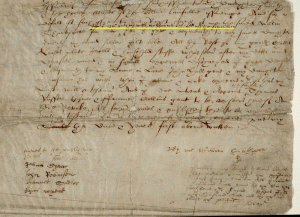Literary texts are notoriously slippery, and evade straight-forward interpretation; indeed, the entire academic discipline of English Literature depends upon that being so.
 Even legal texts, deliberately written to be unambiguous, are open to interpretation: consider, for example, the line in Shakespeare’s will which bequeaths to his wife Anne his ‘second-best bed’. Even where it is clear what the writer intended (to will Shakespeare’s second-best bed to his wife), scholars argue about the underlying motivation. Was it because it was the marital bed, and had sentimental value (the best bed being saved for visitors)? Or was Shakespeare deliberately snubbing the wife he no longer loved by bequeathing her something shoddy? This bequest to his wife is also an interlineation: Anne was not mentioned in the original text of the will, and this line was squeezed in as if it was an afterthought. Scholars argue about the meaning of that, too. Is this because Shakespeare wanted to make sure she received this important romantic item? Or as a legal ruse to prevent her challenging the will — which passes the bulk of his estate to their eldest daughter Susanna — on the grounds that her husband had not remembered her?
Even legal texts, deliberately written to be unambiguous, are open to interpretation: consider, for example, the line in Shakespeare’s will which bequeaths to his wife Anne his ‘second-best bed’. Even where it is clear what the writer intended (to will Shakespeare’s second-best bed to his wife), scholars argue about the underlying motivation. Was it because it was the marital bed, and had sentimental value (the best bed being saved for visitors)? Or was Shakespeare deliberately snubbing the wife he no longer loved by bequeathing her something shoddy? This bequest to his wife is also an interlineation: Anne was not mentioned in the original text of the will, and this line was squeezed in as if it was an afterthought. Scholars argue about the meaning of that, too. Is this because Shakespeare wanted to make sure she received this important romantic item? Or as a legal ruse to prevent her challenging the will — which passes the bulk of his estate to their eldest daughter Susanna — on the grounds that her husband had not remembered her?
Jonson’s epigram is far more slippery than Shakespeare’s will. As we shall see, it was a dangerous age for writers to speak their minds, and those who wrote satirical epigrams never named their targets, always using language in such a way as to leave their exits open. Some authorship sceptics will tell you that ‘Poet-Ape’ is Jonson’s word for actor, and that this narrows the field towards identifying William Shakespeare as his target. Actors are ‘poet-apes’ in the sense that the writer Robert Greene, addressing three poet-playwrights in 1592, described them as ‘those puppets… that spake from our mouths’. But the term was first coined by Sir Philip Sidney, who in his Apology for Poetry, said that bad poetry was not the fault of poets but of poet-apes: those who thought they could write good poetry but couldn’t. Ben Jonson himself actually distinguished them from actors when he wrote in the prologue of his play Poetaster (1601) ‘Are there no Players here? no Poet-Apes…?’, since he continues ‘Either of these would help me’. So his epigram isn’t necessarily fingering an actor.
Click Here to Subscribe and we’ll notify you about new content.